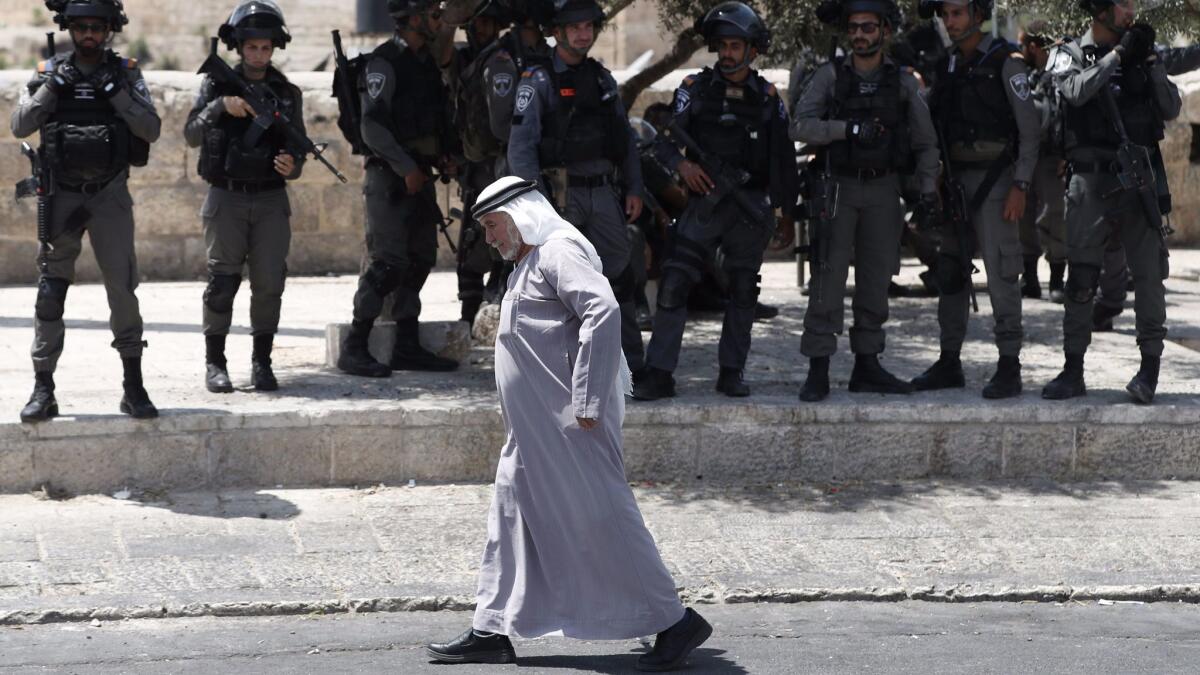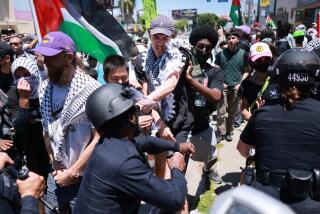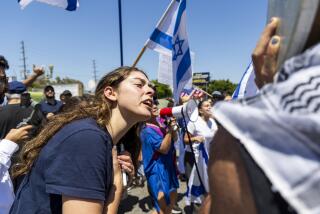A tense peace reigns at Jerusalem holy site claimed by Muslims and Jews

- Share via
Reporting from Jerusalem — Jerusalem was braced for bloodshed following traditional Muslim prayers Friday, but for the first time in two weeks, the city did not yield to violence.
At about 12:15 p.m. local time, as the midday ritual approached, thousands of men gathered on East Jerusalem’s main artery — Salah a Din Street — which leads to the iconic Damascus Gate. But they were kept out of the Old City by Israeli police, who allowed only women and men older than 50 to enter the Al Aqsa Mosque.
The mosque has been the focus of violent confrontations for two weeks, since three gunmen emerged from the mosque’s esplanade early on July 14 and shot dead two Israeli police officers on guard. Israel reacted by shutting down the compound for two days, then installing metal detectors that were viewed by Palestinians as an unacceptable encroachment.
For almost two weeks, in protest, Muslims prayed outside the site, an area Muslims call the Noble Sanctuary, the third holiest site in Islam, and which Jews call the Temple Mount, the site of the ancient Temple of Jerusalem, Judaism’s holiest site. The public prayers rapidly turned into escalating daily confrontations that threatened peace throughout Israel and Palestinian territories.
As prayers were underway Friday, medics put on their latex gloves in anticipation of violence. Journalists, expecting the same, donned their helmets. Mounted police at the end of the street seemed as jittery as the young men fiddling with their phones in shady alleyways, while men knelt on their prayer rugs and stood under a merciless midday sun that sent the temperature to near 90 degrees.
But the prayers started and ended with remarkable order and quiet. By 2 p.m., the street was empty and shuttered storefronts were opening for business.
Riad Aljondry, 50, folded up his prayer mat and placed it in his taxi before tinkering with a loose mirror.
“See?” he said. “When they want to, everything is quiet. It’s all up to them. That’s the truth.”
He was referring to the Israeli police, who on Thursday were involved in violent confrontations with several hundred Palestinian demonstrators in the esplanade surrounding the mosque and the Dome of the Rock. “They have no reason to go up to the mosque. No reason at all to be there. Look at what they did yesterday. They couldn’t bear our joy.”
In what was seen as a victory for the Palestinians, an agreement ending the crisis was announced on Wednesday night, with Israel dismantling and removing the metal detectors and all other forms of security surrounding the plateau.
But there remain plenty of hints that the movement that has rallied Palestinians since the metal detectors were installed is far from over.
In the West Bank, protests were significantly smaller than the intially projected by the Israeli army, but there were skirmishes in several cities, including Bethlehem, Nablus and Hebron.
A 24-year-old Palestinian was killed by Israeli soldiers at the Gush Etzyion junction after he allegedly charged them with a knife. And there were reports of at least one Palestinian killed and three injured in clashes with soldiers on the central Gaza border with Israel.
But in a tense Jerusalem, quiet reigned.
Nasser Janjoun, a medic wearing a bright orange vest with a red crescent, left Salah a-Din Street with a jubilant smile on his face.
“The most important thing is that the Israelis have to understand that they must end the occupation,” he said, referring to them as “sadists.” “They should ask themselves whether they need psychological therapy? Why are they so upset that yesterday we were happy to re-enter the mosque?”
Videos taken after Thursday evening prayers showed violent clashes, with hundreds of Palestinian youths throwing stones and explosives at police officers and Jewish worshipers at the Western Wall. Police spokesman Micky Rosenfeld said that “if several hundred masked Palestinians are throwing petrol bombs and fireworks directly at police and endangering life — if you get hit by these things you get killed instantly — so if necessary, the response is immediate.”
As he left prayers Friday, Mustafa Barghouti, the veteran Palestinian activist and politician, said he was proud of the peaceful nature of the gathering, which “shows the Israelis that we are nonviolent, organized and keeping the initiative in our hands.”
Special correspondent Maher Abukhater contributed reporting from the West Bank. Tarnopolsky is a special correspondent based in Jerusalem.
More to Read
Sign up for Essential California
The most important California stories and recommendations in your inbox every morning.
You may occasionally receive promotional content from the Los Angeles Times.










